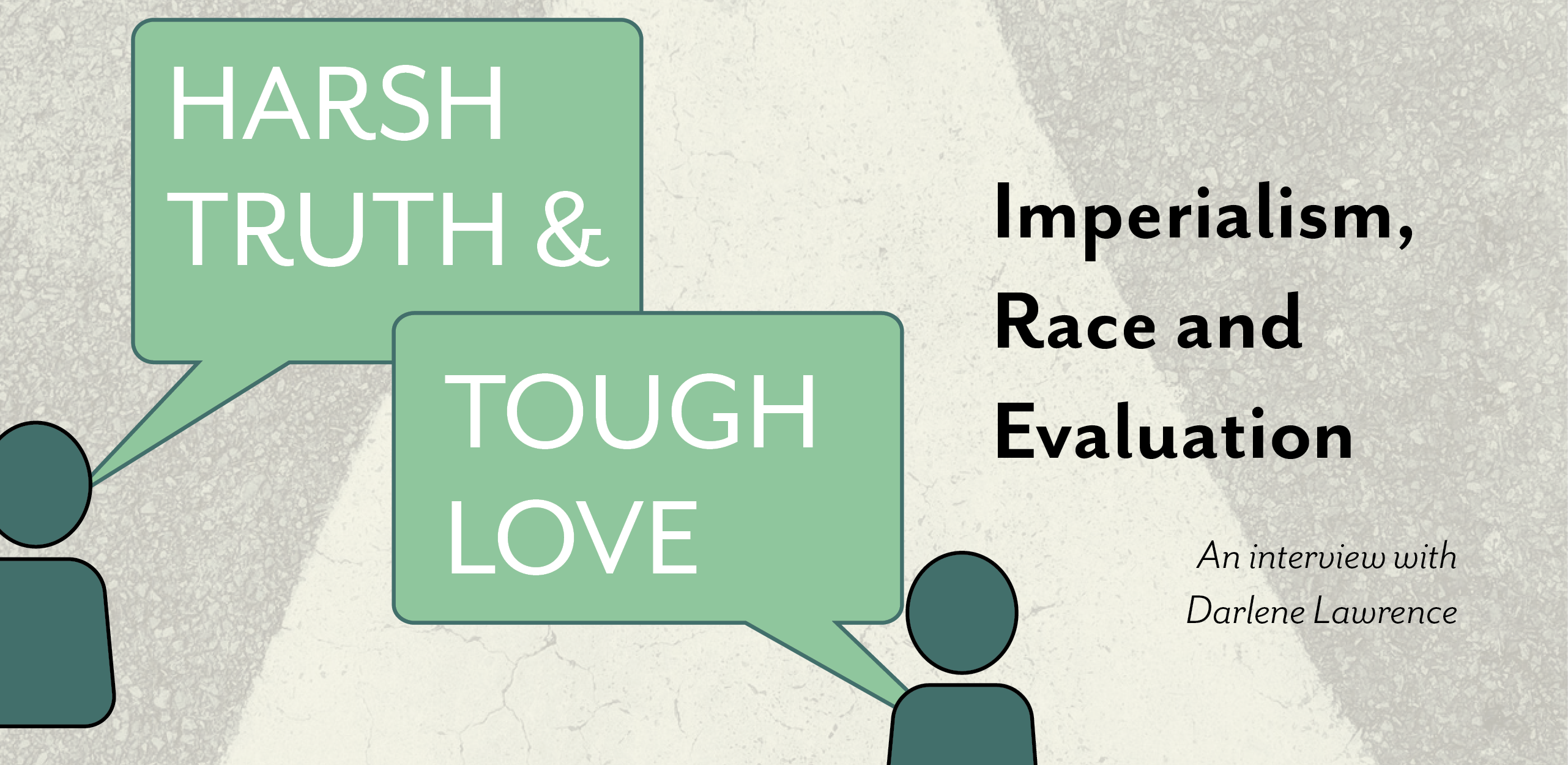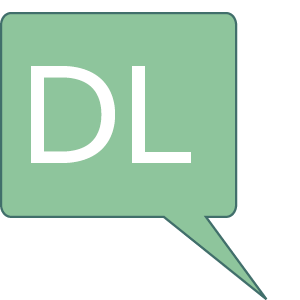Harsh Truth & Tough Love: Imperialism, Race and Evaluation

Charlene Boyce interviews Darlene Lawrence
Inspiring Communities is committed to learning and evaluation and has been since our inception. We have reflected publicly on our learning at all levels, over time. At the same time, we have been pursuing, as many other impact organizations are, the path of decolonizing our work.
What follows is a synopsis of a conversation I recently had with Darlene Lawrence, a former colleague at IC. We felt it was important, in the spirit of learning and radical honesty, to publish some of the reflections shared with us by Darlene, who worked with IC as an evaluator for about a year. Darlene is an Indigenous Black Nova Scotian woman, who is currently employed as a Project Manager with the Social Science Team, the Canadian Centre for Vaccinology, Dalhousie University. She has a master’s degree in education and many years of experience managing programs and doing evaluation in various capacities.
Some of Darlene’s reflections are on the practice of evaluation and some are particular to her work with Inspiring Communities.

I’ve been thinking about the way that you are not an ally unless the person you are allied to says you are an ally: I feel like this applies in decolonizing too. What was your experience like, being an Indigenous Black Nova Scotian evaluator in a still-largely White space?
As an evaluator with Inspiring Communities, my experience with evaluation and White evaluators that are supposed to be inclusive of cultural groups is their dismissal of cultural identities, the very group that they are engaged with evaluating. These are White evaluators who, on the one hand, espouse that they are proactively engaged in doing the work to decolonize, while simultaneously and with tenacity engaging in racialized ideologies.
The tragedy of this cognitive imperialistic mindset is that it continuously facilitates and perpetuates the reproduction of White supremacy. The harm that it has caused creates another level of trauma for Black and First Nations people. To reduce the harm and do the work to decolonize, White evaluators should unwrap and deconstruct their own internalized racism.


We’ve recently updated our strategic directions and are centering equity in our work. This began during your time with IC. What was your experience? How did you see this influence IC’s culture?
My lived experience as an evaluator at an organization claiming to create social change, by adopting principles of equity, diversity and inclusion is that this process required training and acquiring skills in equity, diversity, and inclusion. Not just a theoretical understanding: cerebral learning. It requires lived experience, understanding, learning from people who have been “in the trenches” fighting for social justice, equity and equality.
Online training is not enough. Applying it in real-life situations is key. Accepting and deconstructing your own racism is central to the process. This is difficult work, and you will need a safe space to do that in. But to ignore it is to do a disservice to this type of work.
I experienced this firsthand and was absolutely bewildered and horrified. Evaluation reports I saw excluded issues affecting the Black and First Nations communities—that is, you knowingly engaged in errors of omission. For example, none of the IC evaluation reports conducted in communities throughout the pandemic addressed Chinese and other Asian residents who were experiencing racist attacks. Also, when the moderate livelihood fisheries disputes were happening, IC did not act or speak at all, and the topic did not emerge in evaluation. That silence signals complicity, supports the reproduction of White supremacy, and causes harm.
IC developed a program to train Black and First Nation community members in evaluation. A program for Black and First Nations peoples, but all the trainers were White; and the Black and First Nation evaluators working for IC had been excluded as trainers.


What do you want us to take away from this experience? How can we do evaluation better? What are we not seeing that we need to understand and act on?
I assert that White evaluators conducting evaluations regarding the Black community and/or First Nations are rarely competent to do so. In simplistic terms, how can you evaluate the effects of a program on a people that you know nothing about, a culture that you do not believe exists or, at most, have no awareness of? An absence of knowledge of how these groups are contemporaneously positioned on the periphery of society other than referring to them as marginalized–the total lack of the historical context? This begs the question do these evaluators, by their White privilege, meet the Canadian Evaluation Society’s competencies for Canadian Evaluation Practice – especially those in the domains of Reflective, Situational and Interpersonal Practices?
Evaluation needs to engage in critical analysis. Who is missing among the program participants? How do the incentives work? What are the harsh truths shown? What differences were made? It’s the most difficult thing to evaluate, I know. The impact may appear over time, years later. Usually, it can’t be documented in the short term. But you need to say that and be honest about it. And consider any harms that may have been caused.


We have moved away from the model of having evaluators embedded with each of our place-based projects. Can you talk about your experience of that model?
There is an inherent danger in having an embedded evaluator as a member of a small team. The participants you want to interview as part of the evaluation may be unable to trust the evaluator because they feel the evaluator cannot be critical or is too connected to the team they may wish to criticize or comment honestly on; therefore, these participants will not be honest. They won’t give authentic recommendations or suggestions. If they don’t trust your positionality as an evaluator, then the pursuant evaluation report is a moot point – it will just be more glorification of the impact and outcomes of a program. Not based in critical analysis and evidence-based data, but a continuation of misguided reports based in a fallacy or a dream-like state.
The positionality of the evaluator is critical. Evaluators first must be perceived as objective, knowledgeable of the people, community, and the socio-political environment in which the evaluation is being conducted. And of course, they must possess the evaluation skills necessary to conduct evaluations beyond reproach.
Evaluators are not your “critical friend.” * They are professionals who can bring understanding and skills to the work you do as an employee delivering programs and services. Evaluators provide knowledge sharing and can give insights into the extent the program is effective, why a program exists, who are the beneficiaries, program improvements and knowledge exchange amongst all employees, participants, funders, and other stakeholders


Let’s talk about the role of race among evaluators and in our work. You’ve mentioned White supremacy and imperialism: talk more about that.
Understand how we are all victims of cognitive imperialism: all of us have been brain-washed into this violent mindset. In fact, it’s more like a psychological virus that has penetrated society from the beginning, establishing a stratification of humanness for the sole purpose of rationalizing slavery and the social construction of the term ‘race’, which has no basis in biology and or genetics. The term race was entirely constructed in pseudo-science as justification for colonizing two-thirds of the world’s Indigenous populations – which really meant committing crimes against humanity.
So, this begs the question, why do we still use the term race which presupposes there exists a categorization of humanness? Who benefits from keeping this socially constructed term of race alive? We don’t say the world is still flat! As Freire argues in his book entitled Pedagogy of the Oppressed, we – those who are subjugated to oppression and inequalities – we all possess within us the duality of the oppressor and the oppressed.


I don’t think you’re endorsing the idea of being “colour-blind”, though I can imagine some folks trying to read that into what you said. While we remain bound in systems where inequity is the reality, I think you’ve made some powerful points about acknowledging the role of ‘race’ and the effects of it within evaluations. So how can we engage more Black or Indigenous people or newcomers in evaluation?
Make room for Black people or other culturally diverse peoples…. but this doesn’t mean asking them to assimilate into Eurocentric methodologies, behaviours, value systems, ways of knowing, and on and on. That is cultural genocide. Do the people you invite to ‘the table’ have access to equal power, or are they a token? Being culturally responsive requires a pathway to learning and thus acquiring an appreciation of different cultural values, understanding different lived experiences, how the intersectionality of anti-Black racism impacts every aspect of life. And it is violence!


Inspiring Communities has built diversity through hiring, shifting power and having faith in the process. During your time with the organization, our board hired one of the very few Black woman leaders of an impact organization, Louise, who is eminently qualified, experienced and visionary, gave her the support she required, and that board is now actively pursuing their own decolonizing journey.
I remember you saying clearly in a staff meeting that the way to really commit to diversity is to “Hire. The. People.” And you were right! The shift of power in the organization has been profound from where I am sitting (as a White settler on this land). So how do we keep working to change the tools and processes? How do we make evaluation itself a more culturally respectful and less colonial model?
The organization has made some steps in the right direction but much more is needed to truly center equity in the work. It is one thing to have a greater representation of equity-deserving group members among the staff team. It is another to ensure that everyone in the organization has the knowledge of critical race theory and analysis of the dynamics of power and privilege needed in the work they do.


This is a journey without an end. We are still working on escaping the trappings of colonized systems and getting beyond the anti-Black and anti-Indigenous racism that is a part of our history and present. Thank you for your forthrightness and honesty in sharing your thoughts with us.
RESOURCES FOR MORE:
*Re: “Critical Friends” https://gender-spear.eu/blog/post/14/the-critical-friends-approach
How Evaluation can help solve Wicked Problems
Upcoming Presentation:
Tammy Mudge, Louise Adongo and Darlene Lawrence will be presenting at CES C2023 evaluation conference. On June 20, they will speak at a thematic breakfast on the topic, “Equity in evaluation: first-voice experiences and reflections (personal and professional) and some recommendations.” The presentation will cover some of the themes raised in the discussion above.
Share this:
Comments are closed